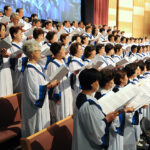
Providing high-quality audio in the house of worship has never been a higher priority than it is now. Whether it’s fair or not, our congregations expect the music to sound like a studio recording and the sermon to be as clear as an NPR broadcast. We deploy the best technology our budgets will allow, we do the best we can due to room acoustics, and we rehearse our musicians and vocalists to provide us with the best possible “raw materials.” Aside from these components, there is yet another very important consideration — our staff. And here, the people behind the tech are substantially more important than the tech itself. The process of recruiting, training and retaining a sufficiently large staff is known by all houses of worship to be challenging — to say the least. And it’s a multi-faceted process… each part is important and cannot be glossed over. Let’s take a journey through the process and sort out the best way to acquire and maintain a staff of folks to get the job done right.
One of the first considerations is whether we’ll maintain a staff of professionals, volunteers or a hybrid of both. Budget is the main determining factor here — professionals cost money! But the expenditure brings us some assurance that we’re putting our services (and potentially expensive technology) in the hands of people who know what they’re doing. There are a couple of options in terms of professionals — we can either hire people permanently, train them and make them part of our staff, or we can temporarily hire in pros from an agency. Permanently hiring our own people yields one particular advantage — we can build on their previous education and experience and train them to do things the way we want them done. This isn’t to say that temps can’t do the job to our liking, but it’s preferable to have people who repeatedly do the job and develop a strong feel for the sequence of our services and our production style.
Temps may come in (at least initially) unaware of our unique process and workflow, and may not get things exactly right at first, even if we bring them in for an advance rehearsal. Obviously, they can eventually learn how we do it and have a better feel, but there’s always a chance that an agency temp may be called off to another church, so we may end up with a different temp for a particular service, and it’s less than optimal if we have to show them the ropes, especially if we get a different temp nearly every week. In my opinion, temp agencies are best suited to providing pros when we’ve had an unexpected absence or temporary shortage of help. If we want pros on the job, we may be better off to hire them permanently, and only use temps if necessary.
The Volunteer Route
If our budget doesn’t allow us to hire pros, the remaining option is utilizing volunteers. Thousands of churches exhibit excellence with teams of volunteers every week. I would guess a majority of church techs are unpaid volunteers, and most of them do a pretty good job. An obvious benefit of using volunteers is the financial savings, but there are others. The sheer fact that church members are willing to volunteer tells us they care about the quality of our services and are willing to give of themselves to maximize it. These people are personally invested in the process. A second benefit is that we have the advantage of training them to get things right in our context. A third benefit is they can develop a good handle on our workflow and process by virtue of sheer consistency. With observation and gentle critique, they can continually improve by repeatedly doing the job, and ultimately “get it down cold.”
Proper recruiting is important in maintaining our team, whether professionals, volunteers or some of each. The term “recruiting” might seem odd in reference to hiring professionals, but the hiring process requires some careful consideration.
We need to decide what attributes we want in our audio professionals, carefully word our help-wanted ad, then thoroughly vet them through a process of interview and perhaps an audition. Extensive training and experience don’t guarantee we’ll get a perfect fit. Personality figures in here, and if we have a very specific way we do things, we’ll want to ensure that our hired gun is willing to do things our way, or at least be humble and diplomatic about suggesting changes. Even a highly experienced front of house expert can really throw a wrench in the works by changing signal routing or other aspects of our established workflow without permission or warning. When we recruit volunteers, we’ll see a broader spectrum of experience and training than with pros, and we must bear that in mind. Some churches are blessed to have excellent techs in the congregation, ready and willing to step up, but as with professionals, we need to insure they’re a good fit. If we have no experienced or trained volunteers, we’ll need to devote some time, effort and resources to preparing them for the work, but we gain the advantage of training them in “our way” of doing things. Bottom line, bringing the right people in from the beginning will contribute to maintaining our team in the long run.
Training is another important consideration; and we may even need to train hired pros to understand our unique processes. Luckily, this proceeds more rapidly with pros than volunteers. In training volunteers, there are two schools of thought: teaching button-pushers or thorough pro audio training. In my opinion, it’s better to take some time and teach the fundamentals of pro audio to our volunteers. It takes time, so start sooner rather than later. There are some great training resources available, particularly online. That said, I’d advise against just emailing volunteers YouTube links and telling them “here — watch these.” They’ll need guidance and the ability to ask questions about things they don’t understand. Organizing weekly classes to train up volunteers is a great way to build team cohesion and a learning environment in which our students can learn from the teacher and from one another. That also helps to build a sense of loyalty.
Bench Depth
Regarding volunteers, bench depth is important in maintaining the team. With only one trained FOH engineer, we’re only one flat tire or stomach bug away from having no one at the controls. A couple of other negatives can also stem from a lack of bench depth. The first is burnout. Everybody needs a day off every once in a while, and rotating through three or four volunteers can nicely facilitate this. Another issue is territoriality. It’s less common, but it can be a problem. We all have to play nice together in the sandbox, and if one of the kids doesn’t like the way the other kids play, we could have trouble in paradise. In my experience, scheduling one person 75% of the time and only occasionally bringing in others can lead to “this is my domain” thinking. Consistently rotating through a number of techs helps create an “all in this together” mentality among volunteers.
Churches who rely completely on volunteers may cross-train their people to handle multiple types of tech. Typically, we’ll have someone mixing front of house, someone handling ProPresenter projection, and someone else handling lighting. There’s nothing inherently wrong with preparing volunteers to jump in as necessary to help out with all of these jobs, but it may have a negative impact on the consistency of experience. If a green volunteer does something different every week, it may be more difficult to get a handle on any one job — they become a jack of all trades and master of none. As an audio pro, I believe audio requires a deeper understanding, and the other jobs are more easily handled by button-pushers due to pre-programming. It may be preferable to assign jobs to volunteers and keep them there unless they express strong interest in learning the other jobs.
Most Importantly…
My advice is to first bring in the right people, pro or volunteer, train them up in your ways, create camaraderie and don’t burn them out. Occasional gatherings for additional training or just to hang out for a backyard barbecue help maintain that family atmosphere too. People who feel like they are all rowing the boat together are happy to stick around.
John McJunkin is an adjunct professor at Grand Canyon University.



